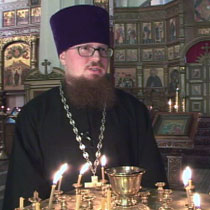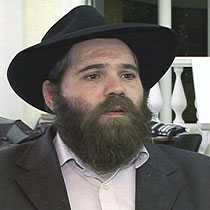2007年VOA标准英语-Different Religions Coexist in Modern Kazakhsta
搜索关注在线英语听力室公众号:tingroom,领取免费英语资料大礼包。
(单词翻译)
By Valer GergelyKazakhstan
22 June 2007
Kazakhstan is a modern, secular1 state promoting ethnic2 and religious diversity and tolerance3. VOA's Valer Gergely reports from Kazakhstan that Islam, Russian and Ukrainian Orthodox, Roman Catholic, Jewish and other religions peacefully coexist in the republic. VOA's Carol Pearson tells the story for producer Valer Gergely.
Communism advocated the suppression and, ultimately, the elimination5 of religious beliefs. After the collapse6 of the U.S.S.R., however, religious beliefs have revived in the newly independent states.
The Cathedral of the Temple of Holy Ascension in Almaty is the main Russian Orthodox Church in Kazakhstan, celebrating its 100-year anniversary this year. The church brings together local and Russian architecture as both Kazakh and Russian people participated in its construction.
Father Alexander is a Russian citizen, serving Kazakhstan's large Russian Orthodox community. He says Kazakhstan has overcome the difficulties of Soviet7 times when religions barely survived. "Some people are not influenced by religion. They are not believers. They don't go to mosques9 or churches. But there is another part of the population that would like to return to spiritual values, religion and culture. They may have fathers or grandfathers influencing them. That is why more and more young people come to the churches. "
Father Alexander says the country's many nationalities and religious groups have excellent relations.
"When we talk about multiple religions, we are talking about two great nations, the Kazakhs and the Russians. These two nations have lived together for 300 years. We've lived together, worked together and we both survived difficult times. Our spiritual values connect us. The relationship now is wonderful. If someone tries to sow discord10 between us, we join together to protect the spiritual values we have nurtured11 for so many years."
In Kazakhstan, Islam was adopted gradually, with complete conversion12 in the 19th century. In the early period of the Soviet Union, the government provided some stability for the existence of Islam. Later, however, it considered it conservative and reactionary13.
 |
| Father Alexander |
In the last few years, however, various sects14 or splinter groups have sprung up beside the established creeds15 and beliefs, causing new security concerns over religious extremism.
"After the collapse of the Soviet Union, many beliefs and creeds came to life in various parts of its former territory, including Kazakhstan. We cannot say for sure that extremism will not come here. It may. This is the reason we should do our best to prevent that kind of propaganda and anti-religious activities that may come from some small sects or groups" says Deputy Imam Mukhtar.
Father Alexander, adds. "Sects are very dangerous for any country, because they try sow discord among people. Turning people against a religion is very dangerous. I grew up among Muslim people and I know that peace between these two religions is very important."
 |
| Rabbi Judas Kubalkin |
Since its independence, Kazakhstan has hosted two international conferences that brought together secular and religious leaders to highlight religious freedom in Kazakhstan. Rabbi Kubalkin says, "The fact that these congresses were held here, and people of different nationalities and religions were able to express their views and dreams, is exemplary. It shows that if we have the will, we can live together peacefully."
Many people of the young generation, such as university student Serik Duisenbaev, look at their religion as their culture. "From the bottom of my heart I believe that there is an almighty16 God who created everything. But I don't pray five times a day because I know what is allowed and what is not. I am not disturbing, not robbing, not killing17 anyone, I am not trying to lie or cheat."
The 24-year-old Duisenbaev recently worked as an interpreter for an Israeli company in Kazakhstan. His boss invited him to visit Israel where he received a Bible. "On the way back, when I was reading this Bible on the train, I had some problem with one of the old Kazakh ladies. She was totally shocked when she saw me reading the Bible. She said this is a book of Jews, why I am reading it, I should read the Koran. For me the Koran may be the book of Allah and Islam, but all the rest is the same. It's just the history of people. I just want to learn more, so I am reading the Bible and the Koran too."
Kazakhstan has had no religious or ethnic conflicts on its territory since its independence, an exception in the region.




